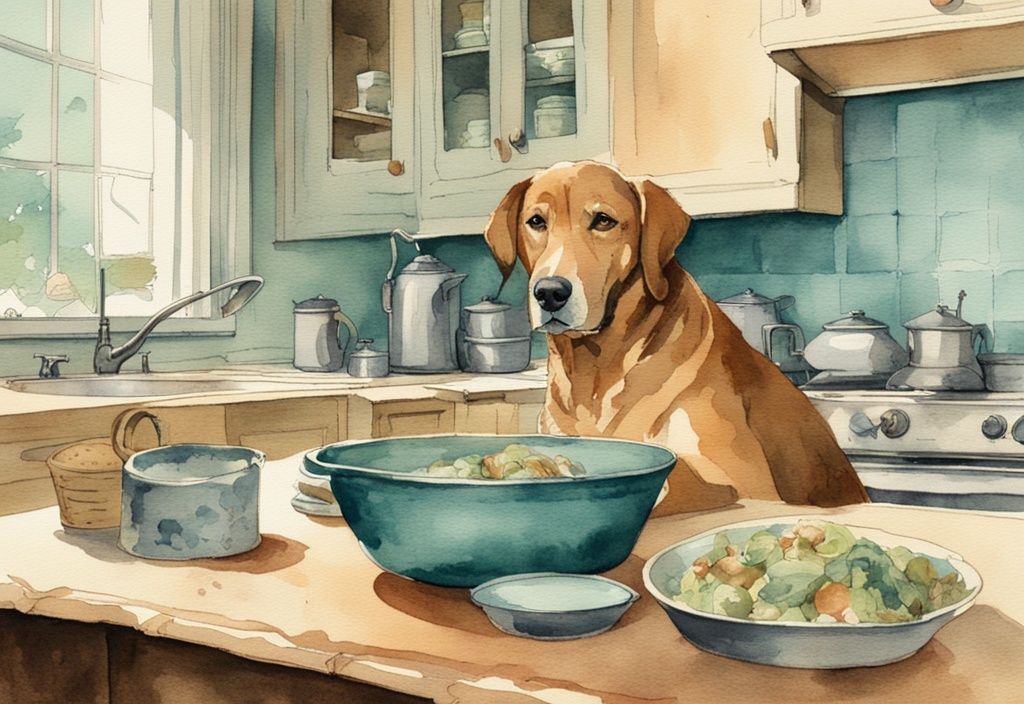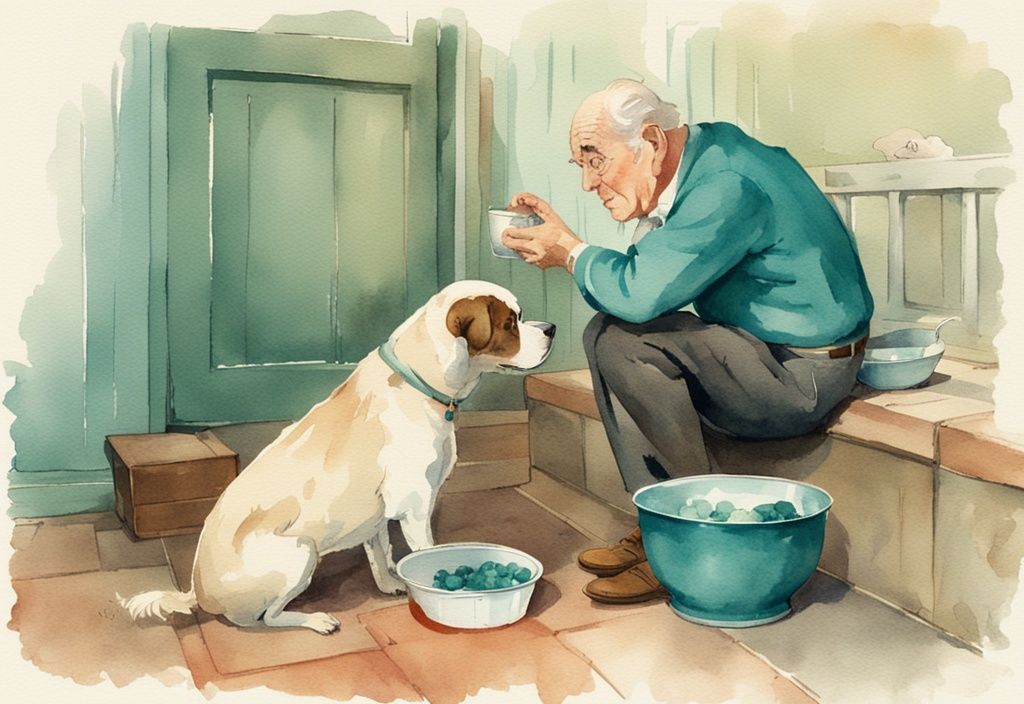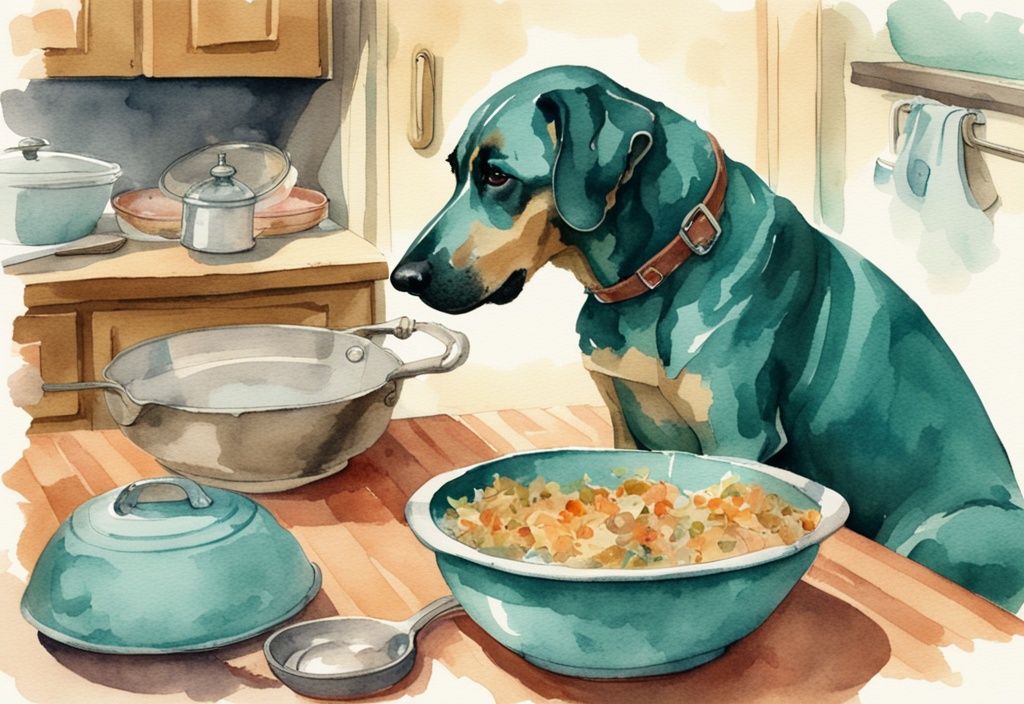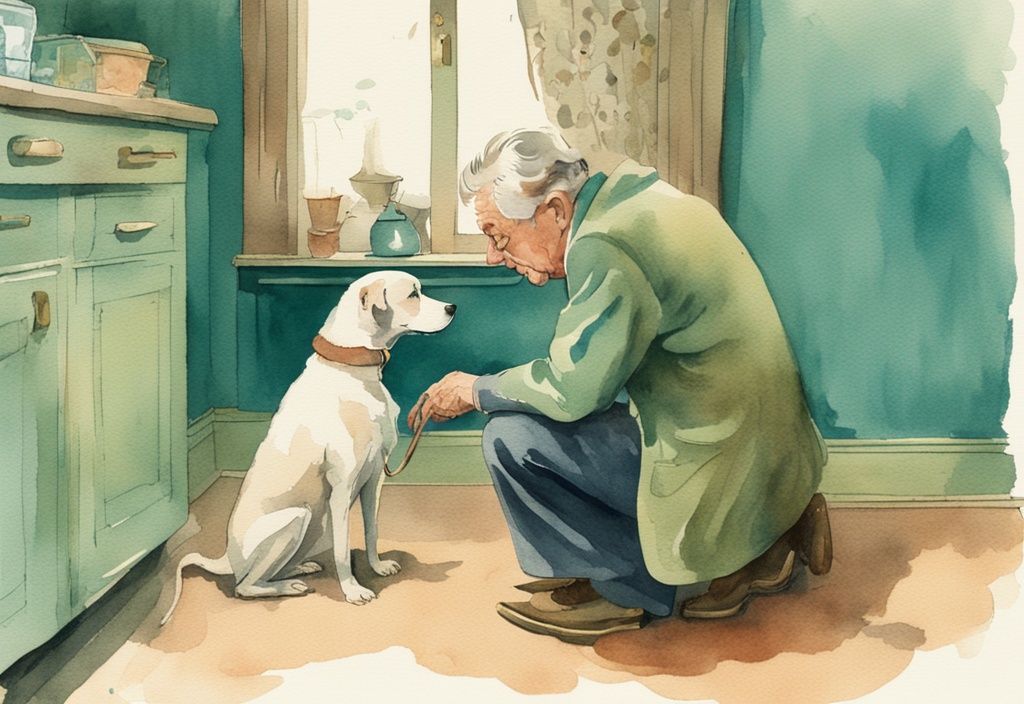Are you watching helplessly as your once food-loving furry pal suddenly turns away from their meals? It’s a situation that leaves us, devoted caregivers, riddled with concern and anxiety. Trust me, I’ve been there too, and you’re not alone.
First and foremost, let me assure you, it’s not uncommon in the senior years of a canine’s life. This piece aims to shed light on the reasons why your old chum might be rejecting their food – from age-related factors to certain medical conditions – and offers actionable solutions to ensure their well-being.
So, stick with me as we navigate this together to get your loyal friend back to their healthy, tail-wagging self, savoring every mealtime with joy! Wouldn’t that be splendid? Let’s delve in.
Understanding Decreased Appetite in Senior Dogs
As our beloved pups grow older, their eating habits can change, sometimes leaving us concerned and puzzled. Various factors can cause a senior dog to lose interest in their meals, and it’s crucial to understand what might be going on so we can help them feel their best.
Age-Related Physical Changes
Our furry friends go through numerous physical changes as they age, which can significantly influence their appetite. One major aspect is the loss of smell or taste, reducing the sensory enjoyment they get from their food. Alongside this, senior dogs often have lower energy needs and a slower metabolism, naturally leading to a diminished appetite.
Physical discomfort, such as something stuck in their throat or mouth, can make eating quite difficult. In some cases, injuries or trauma may not only make it hard for your dog to eat but can also cause them to lose their interest in food altogether.
Identifying Common Medical Conditions
Kidney and Liver Disease
Unfortunately, kidney and liver diseases are prevalent among older dogs and can drastically affect their appetite. These conditions often cause nausea, making food seem unappealing. For instance, if your dog has kidney disease, toxins can build up in their blood, leaving them feeling unwell and reluctant to eat.
Diabetes and Cancer
Diabetes in dogs can lead to significant changes in their eating patterns. You might notice increased thirst and urination accompanying their reduced food intake. On the other hand, cancer can produce a variety of symptoms including pain and general discomfort, both of which can dampen your dog’s desire to eat.
Heart Disease and Arthritis
Heart disease can leave your dog prioritizing breathing over eating due to discomfort, leading to a reduced appetite. Similarly, arthritis can cause significant pain, making it hard for your dog to reach their bowl or chew properly, hence eating less.
Accounting for Gastrointestinal Issues and Dental Problems
When it comes to eating problems, gastrointestinal and dental issues cannot be overlooked.
Pancreatitis and Obstructions
Gastrointestinal problems, like pancreatitis, can be extremely uncomfortable and lead to a loss of appetite due to persistent nausea.
Foreign objects causing intestinal blockages can also be a painful obstacle, making eating an unpleasant experience for senior dogs.
Tooth Abscesses and Gum Disease
Dental issues are a big concern for our aging canine companions. Problems such as wobbly teeth, tooth abscesses, and gum disease can make chewing painful. If your dog has oral infections or mouth sores, eating can become a very unpleasant task, resulting in less food consumption.

Behavioral and Emotional Causes of Reduced Appetite
Our dogs’ emotional well-being is equally important and can significantly impact their eating habits.
Canine Cognitive Dysfunction (CCD)
Canine Cognitive Dysfunction, similar to dementia in humans, can upset your dog’s eating routine. They might forget to eat or feel confused about meal times, leading to a decreased appetite.
Anxiety and Stress Related Factors
Changes in the environment or routine can induce anxiety or stress in dogs, especially seniors. Situations that make your dog anxious can push eating down their priority list, causing them to eat less.
How Environmental Changes Affect Your Dog’s Eating Habits
Even shifts in the weather can impact your dog’s appetite. For instance, hot and humid weather might make them less interested in food. Additionally, if you have multiple dogs, competition for food can lead to a senior dog eating less than they should.
Systemic and Infectious Diseases
Systemic illnesses are another critical area to consider when your senior dog isn’t eating well.
Bacterial and Viral Infections
Bacterial and viral infections can make your dog feel lethargic and unwell, leading to a lack of interest in food. These infections usually bring lethargy, fever, and a general sense of malaise—key reasons why your senior dog might not be eating.
What to Do If a Senior Dog Is Not Eating?
When and Why You Should Consult a Veterinarian
Keeping a close eye on your senior dog’s eating habits is crucial. When your senior dog starts to refuse food, it could signal an issue that needs your attention right away. If this lack of appetite lasts more than 24 hours, it’s time to visit the vet. Although minor appetite changes can be normal, ongoing refusal to eat points to deeper health concerns. Consulting with your vet is essential to determine why is my senior dog not eating. Additionally, understanding common issues like what is a dingleberry on a dog can help in maintaining your pet’s overall health. Potential causes could range from dental problems to serious systemic diseases. By consulting early, you ensure timely diagnosis and effective treatment, helping restore your dog’s appetite and overall health.
Understanding Veterinary Evaluation Procedures
Addressing the question of why is my senior dog not eating often starts with a detailed veterinary evaluation. This usually begins with a thorough physical exam to check for obvious issues like dental problems or physical injuries. Diagnostic tests, such as bloodwork and urine tests, can uncover underlying medical conditions like kidney or liver disease, diabetes, or infections.
Additionally, imaging techniques like X-rays and ultrasounds might be needed to detect internal issues like tumors or gastrointestinal blockages. Managing your dog’s pain or discomfort is critical since it can significantly affect their willingness to eat. The vet will also consider your dog’s overall quality of life and may suggest pain management strategies or dietary adjustments to boost their appetite and comfort.

Practical Tips to Manage and Improve Your Senior Dog’s Appetite
When dealing with the tricky question of “why is my senior dog not eating,” it’s comforting to know that some simple yet effective changes can make a world of difference. From adjusting their diet to creating a positive eating environment, let’s dive into practical strategies that can boost your furry friend’s appetite.
Simple Dietary Adjustments You Can Make at Home
Choosing Stronger-Smelling Food
As dogs age, their sense of smell might diminish, leading to a decreased interest in food. One trick that has worked wonders for many is incorporating stronger-smelling foods into your senior dog’s diet. Opt for foods with a high aroma to stimulate their senses. For instance, fish-based foods or a sprinkle of cheese can considerably enhance the scent and make the meal more enticing.
Soaking Dry Kibble for Easy Consumption
Many senior dogs face dental issues, making chewing dry kibble a bit of a challenge. By soaking the kibble in water or low-sodium broth, it becomes softer and easier to consume. This not only makes eating less of a chore but also provides additional hydration. Simply let the kibble soak for about 10-15 minutes before serving to ensure it reaches a mushy, palatable consistency.
Creating a Comfortable and Positive Feeding Environment
Does Warming Food Help?
Warming your dog’s food can significantly enhance its aroma, making it more appetizing for them. Just a few seconds in the microwave can elevate the scent and stimulate your senior dog’s appetite. Always ensure the food is not too hot to avoid burns and discomfort.
Effective Food Enhancers: Chicken Broth and Tuna Juice
Adding food enhancers like low-sodium chicken broth or tuna juice can make dry food more attractive to your senior dog. These enhancers introduce a strong, appealing scent, and the added moisture makes the food easier to swallow, particularly for dogs with dental issues.
Prescribed Veterinary Solutions
While dietary adjustments and a positive feeding environment can help, sometimes veterinary intervention is necessary if the question “why is my senior dog not eating” persists. Appetite stimulants prescribed by your vet can encourage eating, but it’s crucial to address the underlying issues causing the loss of appetite. Discuss with your vet about medications or supplements that can safely enhance appetite without adverse effects.
FAQ
How Long Can a Senior Dog Go without Eating?
Typically, dogs can manage a few days without food. However, if your senior dog skips meals for more than 24 hours, it’s time to visit the vet. A prolonged lack of appetite could signal underlying health concerns that need immediate attention.
What Should I Do If My Older Dog Refuses to Eat?
Start by keeping a close eye out for other symptoms. Ensure your furry friend has a calm and comfortable feeding spot. If the reluctance to eat continues for more than a day, definitely reach out to your vet. Uncovering the root cause is key to giving your senior dog the care they deserve.

Can Medications Cause Loss of Appetite in Senior Dogs?
Absolutely, certain medications, like antibiotics or pain relief meds, can upset your dog’s stomach, leading to a decrease in appetite. If you suspect that medication is the culprit, it’s best to consult your vet right away to adjust the treatment plan.
Is It Normal for Older Dogs to Eat Less?
Yes, it’s quite common for senior dogs to eat less due to lower energy needs. However, if there’s a drastic or sudden change in their eating habits, it might be a sign of an underlying issue. Always watch for additional symptoms and make sure to consult with your vet to keep your beloved pet healthy.
Key Takeaways: Enhancing Your Senior Dog’s Eating Experience
Sudden appetite changes in senior dogs can be particularly worrisome and often indicate underlying issues. Identifying the root causes is crucial, as these changes can stem from both physical and behavioral factors, and understanding common ailments in senior dogs can provide valuable insights. For more information, check out this resource on [senior dog health problems](https://www.petmd.com/dog/slideshows/care/common-ailments-for-senior-dogs). For instance, medical conditions like kidney disease, diabetes, or dental problems can cause significant discomfort, reducing a dog’s interest in food.
Behavioral and emotional changes such as anxiety, stress, or cognitive dysfunction can also disrupt eating patterns. It’s essential to consider all these potential causes when addressing why your senior dog is not eating.
Employing simple dietary adjustments can make a substantial difference. Enhancing the aroma of the food by choosing stronger-smelling options or warming it can help stimulate a weakened sense of smell. Soaking dry kibble in water or broth can ease consumption, especially for dogs with dental issues. Additionally, ensuring your pet’s diet includes essential nutrients like electrolytes for dogs can support overall health and well-being. Creating a calm and comfortable feeding environment is equally important to encourage regular eating habits.
While these strategies might improve your senior dog’s appetite, prolonged lack of interest in food warrants a veterinary consultation. Veterinary evaluations are critical to diagnose any underlying problems and to develop a pain management plan if necessary. Diagnostic tests like blood work, urine tests, and imaging can pinpoint the exact cause of appetite loss, ensuring your dog receives appropriate treatment.
Using appetite stimulants prescribed by a vet can be helpful, but they should not replace the need to address the root cause of the issue. Always consult with your vet to ensure any medications or supplements used do not cause additional health problems.
In summary, understanding and addressing the reasons behind your senior dog’s reduced appetite involves considering both physical and behavioral factors. Adopting practical dietary adjustments and seeking veterinary advice are key steps in enhancing your senior dog’s eating experience. This comprehensive approach ensures your dog remains healthy and happy in their senior years.
